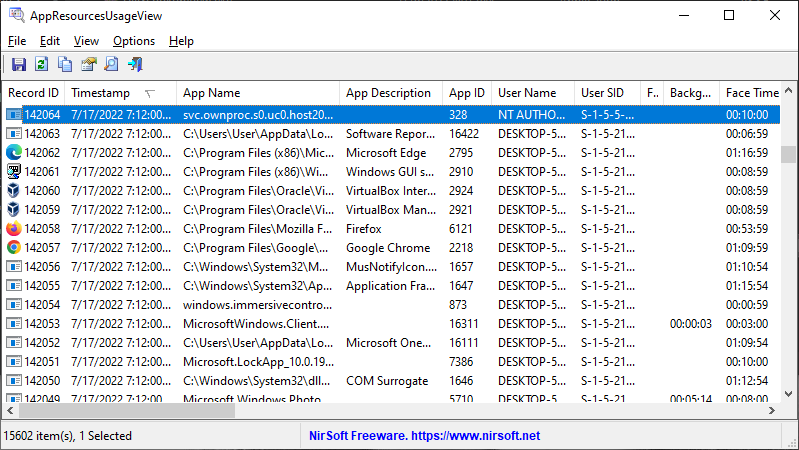| |

| AppResourcesUsageView v1.06
Copyright (c) 2022 - 2024 Nir Sofer
|
Description
AppResourcesUsageView extracts and displays the application resources usage information stored in the SRUDB.dat database of Windows 10 and Windows 11.
The application resources usage data is automatically collected by Windows operating systems and includes the following information:
Record ID, Timestamp, Application, User,
Cycle Time (Foreground/Background), Face Time, Context Switches (Foreground/Background), Bytes Read/Written (Foreground/Background), Read/Write Operations Count (Foreground/Background).

System Requirements
- This tool works on Windows 10 and Windows 11. Both 32-bit and 64-bit systems are supported.
- This tool is just a small standalone .exe file that you can run on any system without installing anything.
Data Source
The application resources usage data is taken from the following database file: C:\Windows\System32\sru\SRUDB.dat
The following table contains the application resources usage data: {D10CA2FE-6FCF-4F6D-848E-B2E99266FA89}
Version History
- Version 1.06:
- Fixed bug: AppResourcesUsageView crashed when trying to read the resources usage database created by Windows 11 24H2.
- Version 1.05:
- Added option to change the sorting column from the menu (View -> Sort By). Like the column header click sorting, if you click again the same sorting menu item, it'll switch between ascending and descending order. Also, if you hold down the shift key while choosing the sort menu item, you'll get a secondary sorting.
- Also added 'Sort By' button to the toolbar.
- Version 1.01:
- Added 'Align Numeric Columns To Right' option.
- Version 1.00 - First release.
Start Using AppResourcesUsageView
AppResourcesUsageView doesn't require any installation process or additional DLL files. In order to start using it, simply run the executable file - AppResourcesUsageView.exe
After running AppResourcesUsageView - if the SRUDB.dat database file is locked , AppResourcesUsageView will ask you whether you want to run it as administrator in order to access the locked file. If the file is not locked, AppResourcesUsageView will load it instantly.
'Advanced Options' Window
In the 'Advanced Options' window (F9), you can choose to load the SRUDB.dat database from external drive or from a remote computer on your network.
Be aware that loading the application resources usage information from a remote computer works only when the database file on the remote computer is not locked.
You can also choose to load the application resources usage data from the last xx days hours or from the specified date/time range.
Command-Line Options
|
/stext <Filename>
|
Save the app resources usage information to a simple text file.
|
|
/stab <Filename>
|
Save the app resources usage information to a tab-delimited text file.
|
|
/scomma <Filename>
|
Save the app resources usage information to a comma-delimited text file (csv).
|
|
/shtml <Filename>
|
Save the app resources usage information to HTML5 file (Horizontal).
|
|
/sverhtml <Filename>
|
Save the app resources usage information to HTML5 file (Vertical).
|
|
/sxml <Filename>
|
Save the app resources usage information to XML file.
|
|
/sjson <Filename>
|
Save the app resources usage information to JSON file.
|
|
/sort <column>
|
This command-line option can be used with other save options for sorting by the desired column. The <column> parameter can specify the column index (0 for the first column, 1 for the second column, and so on) or the name of the column, like "Timestamp" and "App Name". You can specify the '~' prefix character (e.g: "~User Name") if you want to sort in descending order. You can put multiple /sort in the command-line if you want to sort by multiple columns.
|
|
/cfg <Config Filename>
|
Start AppResourcesUsageView with the specified config file.
|
|
/Columns <Comma Delimited Columns List>
|
Allows you to set the columns to display or the columns to export from command-line.
You have to specify the column names, delimited by comma, for example:
AppResourcesUsageView.exe /scomma c:\temp\app-resources.csv /Columns "Timestamp,App Name,App Description,User Name,Foreground Bytes Read,Foreground Bytes Written"
You can also specify the column names without space characters, for example:
AppResourcesUsageView.exe /Columns "Timestamp,AppName,App Description,UserName,ForegroundBytesRead,ForegroundBytesWritten"
|
Translating AppResourcesUsageView to other languages
In order to translate AppResourcesUsageView to other language, follow the instructions below:
- Run AppResourcesUsageView with /savelangfile parameter:
AppResourcesUsageView.exe /savelangfile
A file named AppResourcesUsageView_lng.ini will be created in the folder of AppResourcesUsageView utility.
- Open the created language file in Notepad or in any other text editor.
- Translate all string entries to the desired language.
Optionally, you can also add your name and/or a link to your Web site.
(TranslatorName and TranslatorURL values) If you add this information, it'll be
used in the 'About' window.
- After you finish the translation, Run AppResourcesUsageView, and all translated
strings will be loaded from the language file.
If you want to run AppResourcesUsageView without the translation, simply rename the language file, or move
it to another folder.
License
This utility is released as freeware.
You are allowed to freely distribute this utility via CD-ROM, DVD,
Internet, or in any other way, as long as you don't charge anything for this and you don't
sell it or distribute it as a part of commercial product.
If you distribute this utility, you must include all files in
the distribution package, without any modification !
Disclaimer
The software is provided "AS IS" without any warranty, either expressed or implied,
including, but not limited to, the implied warranties of merchantability and fitness
for a particular purpose. The author will not be liable for any special, incidental,
consequential or indirect damages due to loss of data or any other reason.
Feedback
If you have any problem, suggestion, comment, or you found a bug in my utility,
you can send a message to support@nirsoft.net
AppResourcesUsageView is also available in other languages. In order to change the language of
AppResourcesUsageView, download the appropriate language zip file, extract the 'appresourcesusageview_lng.ini',
and put it in the same folder that you Installed AppResourcesUsageView utility.
|
|

